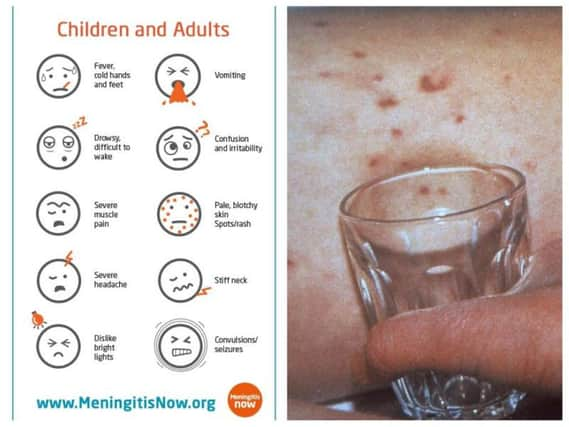How to keep your children safe from meningitis as they go off to university


Today marks the launch of an awareness campaign by charity Meningitis Now, which is calling on parents to educate their teenage children on the symptoms and risks of the disease.
Teenagers are the second most at-risk group of contracting meningitis - so the charity is also appealing for mums and dads to ensure their children are vaccinated against Men ACWY.
Advertisement
Hide AdAdvertisement
Hide AdThe campaign is also telling parents to pack a Meningitis Now signs and symptoms card, fridge magnet or year planner in their child’s bag to raise vital awareness and to keep an eye on their friends. It could save lives.
Dr Tom Nutt, chief executive of Meningitis Now, said: “Teenagers are the second most at risk group of contracting meningitis after babies and toddlers - and up to a quarter of students carry the bacteria that can cause meningitis, compared to one in ten of the general population.
“It’s vital to be up to date with vaccinations but these won’t protect your child against all types of the disease.
“Make sure they know the signs and symptoms and that fast action saves lives and improves outcomes.”
How does the disease spread?
Advertisement
Hide AdAdvertisement
Hide AdUniversity freshers can be more vulnerable to contracting meningitis due to cramped living conditions.
In many cases, young people come together from all over the world to live in one place and can be exposed to bacteria and viruses their bodies have not met before.
This is why so many new students get ‘so-called "freshers flu".
Every university in the UK could experience one case of meningitis among its students within the first term.
Advertisement
Hide AdAdvertisement
Hide AdFirst-year students up to the age of 25 can get a free vaccination for Men ACWY from their GP. Many will have already received this jab at school.
But this does not protect them against all strains of the disease and they are unlikely to have been vaccinated against Meningitis B, leaving them at risk.
Campaigner Michelle Bresnahan lost her 16-year-old son Ryan to Meningitis B in 2010. Since his death, she and daughter Charlotte have worked hard to raise awareness and protect more young people.
She added: "I know only too well how devastating this disease can be and have seen the worst it can do, destroying young lives and tearing apart those who remain.
Advertisement
Hide AdAdvertisement
Hide Ad“No one should be left counting the cost of inaction – I’m appealing to all parents to act now to ensure their children are safe.”
What is meningitis?
Meningitis is inflammation of the membranes that surround and protect the brain and spinal cord; usually caused by bacteria or viruses.
Some bacteria that cause meningitis also cause septicaemia (blood poisoning).
There are an estimated 3,200 cases of bacterial meningitis and septicaemia each year in the UK.
What are the symptoms?
Advertisement
Hide AdAdvertisement
Hide AdThe early signs and symptoms of meningitis and septicaemia can be similar to flu, tummy bug or a hangover and include fever, headache, nausea, vomiting, diarrhea, muscle pain, stomach cramps and fever with cold hands and feet.
More specific signs and symptoms include fever with cold hands and feet, drowsiness, confusion, pale blotchy skin, stiff neck, dislike of bright lights and a rash which doesn’t fade under pressure.
Public Health England has reported 747 cases of meningococcal meningitis and septicaemia in England last year, with 18% of cases occurring in young adults aged between 15 to 24.
Of those who contract bacterial meningitis one in 10 will die and one in three survivors will be left with life-changing after-effects.
How you can get involved
Advertisement
Hide AdAdvertisement
Hide AdMeningitis Now is offering free information packs to parents and students.
These packs include leaflets, signs and symptoms cards, fridge magnets and year planners - all of which contain lifesaving information.
They are available for free from the charity's website.Later in the year, the charity's awareness campaign will target universities and new students directly.